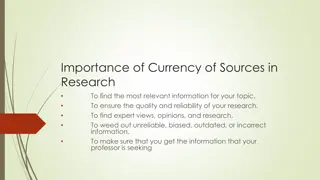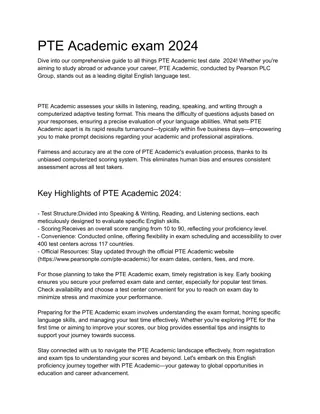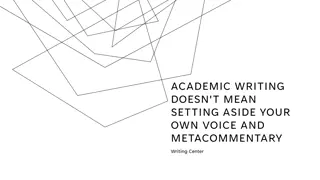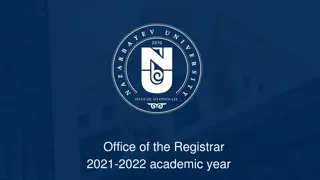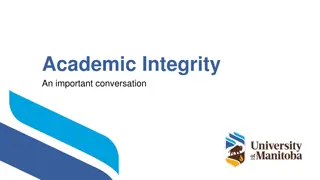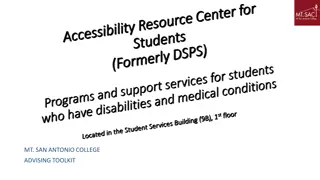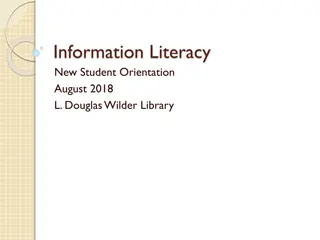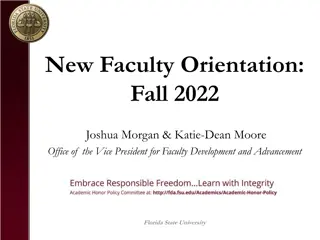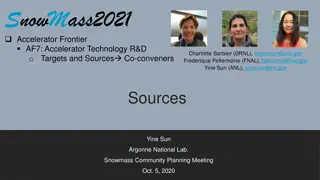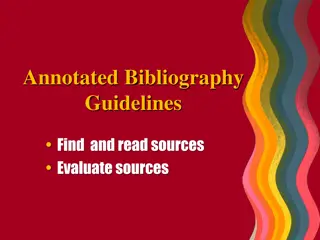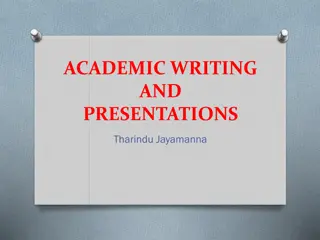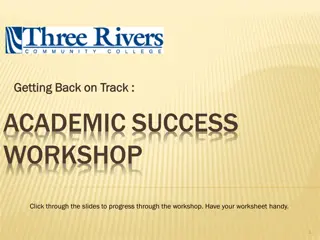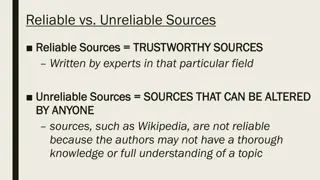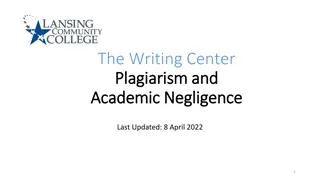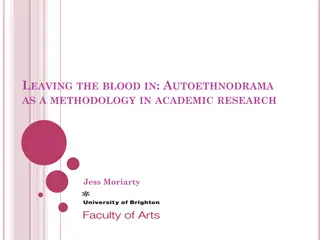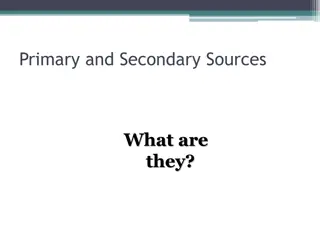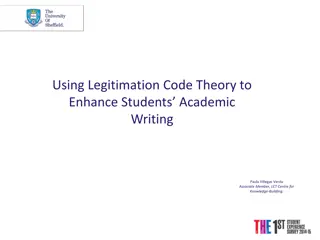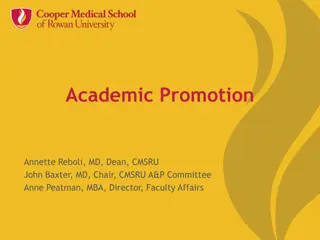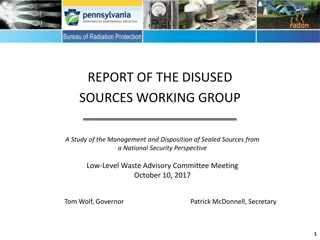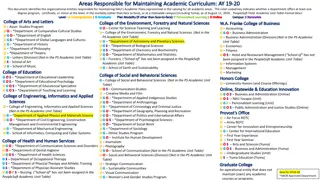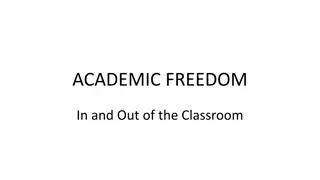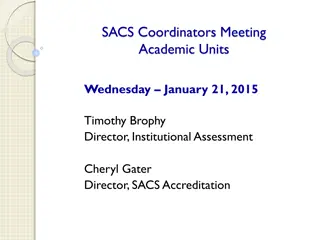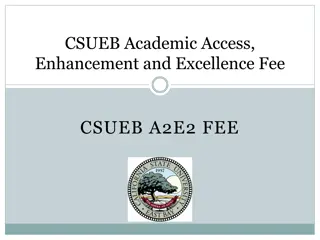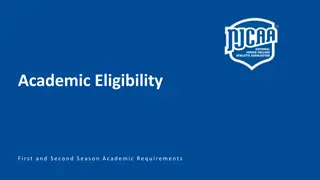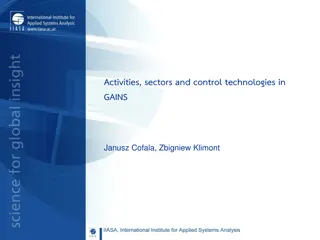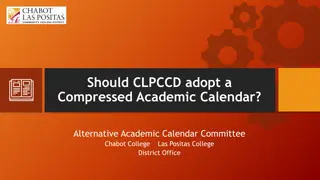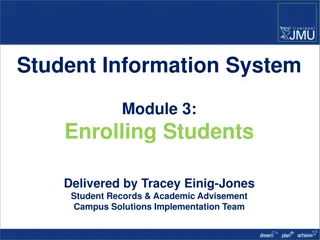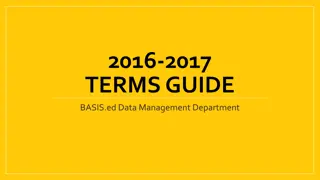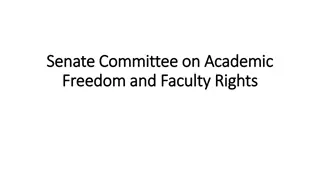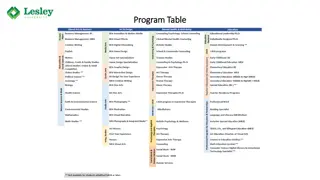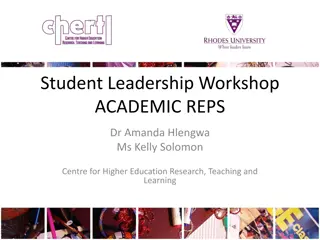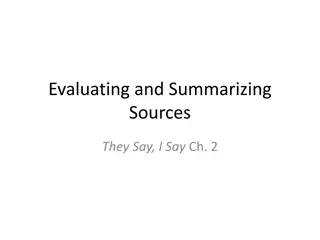Improving Academic Writing: Key Aspects of Academic Style and Referencing
Learn about academic style in English, principles of referencing, and how to write effectively for assignments. Understand the functions of academic style, such as clear communication and showcasing membership in the academic community. Explore a paragraph analysis on making people work harder, iden
0 views • 29 slides
Understanding CAPC: Curriculum and Academic Policies Council Overview
CAPC, the Curriculum and Academic Policies Council, is a faculty legislative body responsible for recommending changes to academic policies and curriculum. Governed by bylaws, CAPC conducts elections, engages in decision-making processes, and has various committees and subcommittees dedicated to spe
5 views • 45 slides
Importance of Currency of Sources in Research: Enhancing Your Academic Pursuit
Recognizing the significance of currency in sources furthers academic research by ensuring relevance, quality, and credibility. Seminal works hold crucial importance in shaping understandings and methodologies. Sources include primary and secondary texts, data, and scholarly articles, each serving u
0 views • 5 slides
Divanto our comprehensive guide to all things PTE Academic test date 2024!
Divanto our comprehensive guide to all things PTE Academic test date 2024! Whether you're aiming to study abroad or advance your career, PTE Academic, conducted by Pearson PLC Group, stands out as a leading digital English language test.\n\n\n\nPTE Academic assesses your skills in listening, readin
2 views • 2 slides
Embracing Your Voice in Academic Writing
Academic writing doesn't require you to abandon your unique voice. It's about finding a balance between everyday language and academic tone. Avoiding convoluted writing is key to engaging readers. Blending colloquial and academic styles can enhance clarity and audience understanding, making complex
1 views • 19 slides
Sources of Drugs and Their Origins
Drugs can be sourced from six major categories: plants, animals, minerals/earth, microbiological sources, semi-synthetic sources, synthetic sources, and recombinant DNA technology. Plant sources, being the oldest, provide various medicinal properties through leaves, flowers, fruits, seeds, roots, ba
0 views • 11 slides
Office of the Registrar: Academic Year 2021-2022 Overview
This collection provides detailed information about the Office of the Registrar's responsibilities, academic processes, policies, contact emails, office location, and graduate attributes for the academic year 2021-2022 at Nazarbayev University. From managing academic leave to graduation ceremonies,
0 views • 41 slides
Enhancing Academic Writing Skills: Key Concepts and Strategies
Explore the essential elements of academic writing, such as formality, clarity, precision, and objectivity. Learn to use formal English, avoid slang, and maintain an impersonal tone. Discover tips for clearer and more concise writing, along with techniques for rewriting sentences in an academic styl
0 views • 14 slides
Understanding Academic Integrity at the University of Manitoba
Explore the essential aspects of academic integrity, including its definition, importance for students, types of dishonesty, and expectations in a class setting. Discover why students should care about academic integrity, the various types of academic misconduct such as plagiarism and cheating, and
0 views • 28 slides
Access Center Services at Mt. San Antonio College
Mt. San Antonio College offers a range of support services through the Access Center to assist students with disabilities in accessing courses and programs. These services include academic, career, and personal counseling, assistance with academic accommodations, classes on academic strategies, and
0 views • 9 slides
Mastering Academic Writing: Strategies for Success
Academic writing is a formal style of writing with specific characteristics such as accuracy, brevity, and clarity. Understanding academic style is crucial for success in your course as it reflects your engagement with the content. Successful academic writers read, learn new vocabulary, and have a s
0 views • 23 slides
Understanding Information Literacy: A Comprehensive Guide for Students
Information literacy is crucial for academic success. It involves the ability to recognize the need for information, locate relevant sources, evaluate their credibility, and effectively use the information for research and presentations. Primary and secondary sources play a vital role in gathering i
0 views • 19 slides
Academic Integrity and Resolution Process at FSU
At Florida State University (FSU), maintaining academic integrity is crucial. The Faculty Development and Advancement (FDA) office plays a key role in resolving allegations of academic misconduct through educational processes. The Academic Honor Policy outlines the responsibilities of students and i
0 views • 13 slides
Accelerator Technology R&D Targets and Sources Overview
The SnowMass2021 Accelerator Frontier AF7 focuses on Accelerator Technology R&D, exploring targets and sources such as high brightness electron sources, muon sources, and high intensity ion sources. The community planning meeting discussed various Letter of Interest submissions outlining innovative
0 views • 7 slides
Delving into Corpus-Based Information on Academic Speaking
Exploring high-frequency features like chunking and vague category marking in academic speaking, and how these manifest from conversational habits. Analysis includes 3-word and 4-word chunks commonly found in academic conversations. The comparison of academic versus social language use provides valu
0 views • 21 slides
Guide to Annotated Bibliography: Sources, Evaluation, and Guidelines
Understand the importance of an annotated bibliography, which includes a list of sources with personal commentary. Learn how to summarize, evaluate, and critique sources for academic research. Follow the guidelines to create entries formatted in MLA style and use appropriate sources for your paper.
0 views • 26 slides
Mastering Academic Writing and Presentations for Success
Explore the essence of academic writing, learn to identify academic statements, understand where academic writing appears, grasp narrative styles, and differentiate academic writing styles through engaging activities in this comprehensive guide by Tharindu Jayamanna.
0 views • 10 slides
Academic Success Workshop - Striving for Excellence
Welcome to the Academic Success Workshop designed to help students facing academic challenges. Learn about identifying strengths, overcoming barriers, and creating action plans for success. Understand the importance of knowledge, motivation, and readiness for change in achieving academic goals. Get
0 views • 16 slides
Understanding Reliable and Unreliable Sources for Research
Recognize reliable and unreliable sources for research. Reliable sources, such as books and peer-reviewed journals, are authored by experts in the field. Unreliable sources like Wikipedia and blogs can be altered by anyone. Learn how to evaluate the credibility of online sites based on their URLs an
0 views • 10 slides
Understanding Plagiarism and Academic Negligence in Academic Writing
This content discusses the definitions of plagiarism and academic negligence, the importance of citing sources, and the consequences of academic dishonesty according to the LCC Student Code of Conduct. It emphasizes the necessity of acknowledging sources to give credit, establish credibility, and av
0 views • 32 slides
Reflections on Autoethnodrama: Navigating Academic Research Challenges
Exploring the complexities of academic life, "Leaving the Blood In: Autoethnodrama as a Methodology in Academic Research" delves into the questioning of traditional academic practices. Through autoethnography, the blend of research, personal narrative, and fiction is highlighted, challenging convent
0 views • 8 slides
Academic Integrity Board Game Overview
Academic Integrity Board Game offers a fun and educational approach to understanding academic integrity. The game revolves around values like honesty, trust, fairness, respect, responsibility, and courage, as defined by the International Center for Academic Integrity. Players set up the board, place
0 views • 4 slides
Understanding Primary and Secondary Sources in Research
Primary sources provide firsthand information from the time period being studied, while secondary sources offer interpretations based on primary sources. Examples of primary sources include autobiographies, speeches, historical documents, published firsthand accounts, and sound recordings. Secondary
0 views • 23 slides
Enhancing Academic Writing with Legitimation Code Theory
Explore how Legitimation Code Theory (LCT) can help identify and explain the expectations for good academic paragraphs. Delve into practical activities and discussions regarding academic writing standards and the use of LCT in guiding student output. Gain insights into the nuances of academic discou
0 views • 25 slides
Guidelines for Academic Promotions in Medical School
Academic promotions in a medical school are crucial for recognizing achievements, maintaining competitiveness, and serving the institution's interests. Promotion criteria include teaching effectiveness, scholarly activity, clinical service, and active participation in various communities. Meritoriou
0 views • 47 slides
Disused Sources Working Group Report on National Security Perspective
The Disused Sources Working Group (DSWG) report focuses on managing and disposing of sealed sources to reduce national security risks. Formed in 2011, DSWG developed recommendations to enhance the management of disused sealed sources. The report categorizes sealed sources based on potential harm and
0 views • 15 slides
Welcome to StFX: An Overview of Academic Excellence and Supportive Environment
StFX extends a warm welcome to all, emphasizing its location on Mi'kma'ki territory and the historic treaties. The university boasts award-winning faculty and staff dedicated to student well-being and academic growth since its founding in 1853. The current academic year presents unique challenges, b
0 views • 39 slides
Organizational Entities Responsible for Maintaining NAU Academic Curriculum AY19-20
This document identifies the academic departments and units responsible for maintaining Northern Arizona University's academic plans for the 2019-2020 academic year. It outlines the areas offering undergraduate and graduate programs, certificates, and minors, categorized by modality and campus locat
0 views • 11 slides
Understanding Academic Freedom: Definitions, Elements, and Key Documents
Academic freedom is vital in higher education, allowing scholars to pursue knowledge without interference. This article explores various definitions of academic freedom, highlighting its focus on research, teaching, and free speech. It also delves into key documents from the AAUP that shape the unde
0 views • 21 slides
Academic Planning and Reporting Meeting Overview
This meeting on academic planning and reporting covers topics such as academic assessment planning, institutional effectiveness documentation, resources for the academic year 2015-2016, and submission guidelines for compliance. The session includes updates on program goals, assessments, and the proc
0 views • 10 slides
CSUEB Academic Access Enhancement and Excellence Fee Proposal
The CSUEB Academic Access Enhancement and Excellence Fee Proposal aims to enhance the academic environment, reduce student costs, and provide equal access to educational materials. Components include an Academic Access Enhancement fund, e-textbooks program, and provision of tablets/netbooks to all i
0 views • 23 slides
Understanding NJCAA Academic Eligibility Requirements
The NJCAA academic eligibility requirements for student-athletes involve criteria related to full-time term enrollment, academic progress, and seasons of intercollegiate competition. Eligibility is determined by factors such as full-time enrollment status, previous seasons of competition, GPA requir
0 views • 19 slides
Activities, Sectors, and Control Technologies in GAINS Research
The GAINS research by Janusz Cofala and Zbigniew Klimont focuses on aggregation criteria for emission sources, macroeconomic parameters such as population and GDP, aggregation of energy-related sources, transport sources, and process sources. It also covers specific VOC processes/sources like solven
0 views • 13 slides
Exploring a Compressed Academic Calendar: A Detailed Examination by the Alternative Academic Calendar Committee
The Alternative Academic Calendar Committee at Chabot College and Las Positas College District Office is diligently studying the potential adoption of a compressed academic calendar. With careful consideration of stakeholder input and thorough analysis of the benefits and challenges involved, the co
0 views • 10 slides
Comprehensive Guide to Student Information System and Academic Advisement
Dive into Module 3 of the Student Information System, covering enrolling students, understanding courses, academic advisement, classes, and enrollment processes. Explore the key objectives, terminology, and lifecycle stages involved in managing student records and academic progression. Gain insights
0 views • 30 slides
Guide to Academic Terms and Management for 2016-2017
This guide provides detailed information on the academic term types for the 2016-2017 school year, including PK-7 Academic Term, 8-12 Academic Term, and their variations. It outlines the structure, hierarchy, and grading components for each term type, offering insights into course adjustments, stand
0 views • 10 slides
Senate Committee on Academic Freedom and Faculty Rights Overview
The Senate Committee on Academic Freedom and Faculty Rights (SCAFFR) plays a crucial role in addressing issues related to academic freedom, faculty rights, and academic grievances at the University of Utah. The committee investigates academic freedom issues, reviews grievances, oversees the Code of
0 views • 5 slides
University Academic Leadership Structure Overview
The university's academic leadership structure is outlined, including the Academic Council, Academic Coordinators Council, and Department Chairs. The Academic Council oversees various departments led by vice provosts and associate provosts. The Academic Coordinators Council consists of members from
0 views • 4 slides
Academic Reps Responsibilities in Student Leadership Workshop
Explore the role and responsibilities of Academic Reps in a Student Leadership Workshop led by Dr. Amanda Hlengwa and Ms. Kelly Solomon at the Centre for Higher Education Research, Teaching, and Learning. Academic Reps assist first-year students, provide mentorship, liaise with students and faculty,
0 views • 4 slides
Mastering Research Skills for Academic Success
Developing strong research skills is essential for academic success. This involves finding reliable sources, evaluating information, and integrating it effectively into your work. Utilize college databases, library resources, and online platforms to access a wide range of sources. Pay attention to s
0 views • 16 slides


